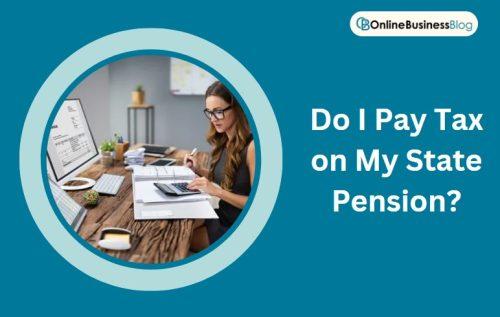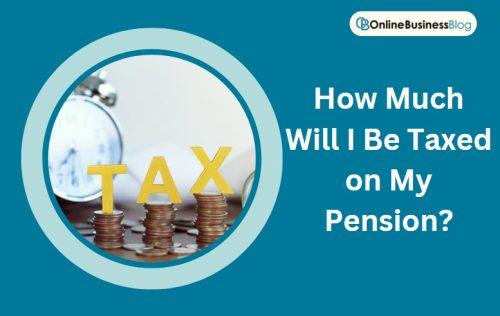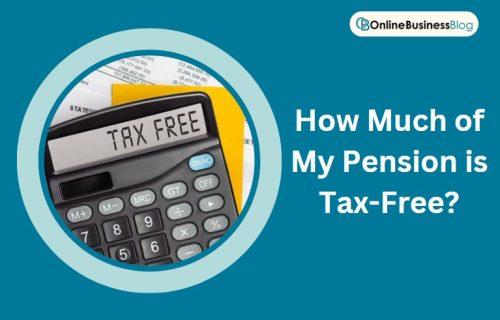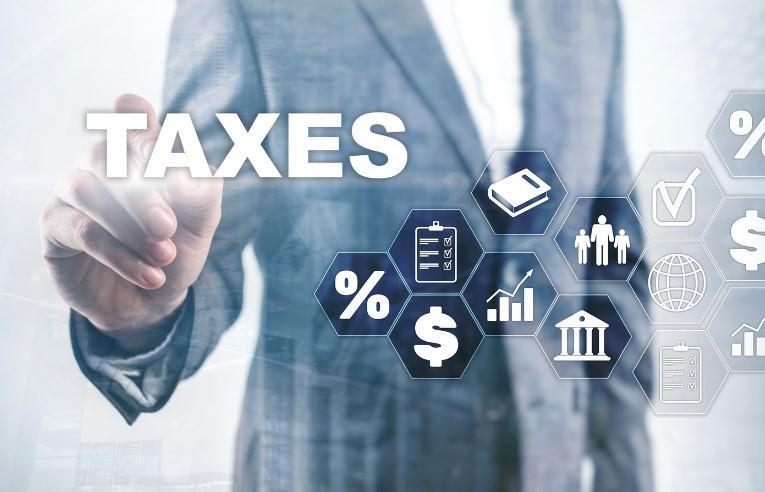Post Contents
Discover the secrets to keeping more of your hard-earned pension in your pocket! We all want to avoid paying unnecessary taxes, especially when it comes to our retirement savings. In this blog post, we’ll dive into the world of pensions and explore clever strategies that can help you minimize your tax bill in the UK. From understanding how much of your pension is tax-free to leveraging drawdown schemes for maximum flexibility, we’ve got you covered. So grab a cuppa and get ready to unlock expert tips on how to navigate the complex realm of pension taxation like a pro!
Do I Pay Tax on My State Pension?

When it comes to your state pension, the burning question on your mind might be: Do I have to pay tax on it? Well, the answer isn’t as straightforward as a yes or no. State pension income is indeed taxable, but whether you actually have to pay tax depends on one crucial factor – your total annual income.
In the current tax year of 2023/24, the annual allowance stands at £12,570. If your only source of income is from the state pension and it falls within this threshold, rejoice! You won’t have to fork over any of your hard-earned cash to Uncle Sam…or rather Her Majesty’s Revenue and Customs.
However (and there always seems to be a however), if you’re receiving income from other sources that push your overall earnings above this magical figure, then brace yourself for an encounter with everyone’s favourite entity – income tax.
Let me give you an example to illustrate how this works in practice. Meet Adam. He receives the full new state pension amounting to £9,627.80 per year. On top of that fortunate windfall, he also enjoys an annuity payment totalling £8,000 annually.
Now here comes the math part (don’t worry; we’ll keep things simple). With a combined total income of £17,627.80 for Adam in that particular year, after deducting his annual allowance of £12,570 (because who doesn’t love deductions?), he’s left with a taxable sum of £5,057.80.
And what happens next? Brace yourself—20% will nibble away at that amount like a hungry squirrel devouring acorns before winter hits! Yep—that means Adam owes approximately £1,011.56 in good old-fashioned income tax.
After settling his dues with HMRC (Her Majesty’s Revenue and Customs) like any upstanding citizen would do (nobody wants trouble with those folks), Adam’s net income after tax stands at a respectable £16,616.24.
So there you have it: a simple example of how income tax works when it comes to your state pension. The only way to dodge this bullet is by making sure your total annual income stays within the magical £12,570 mark. Anything above that and you can kiss that extra cash goodbye!
How Much Will I Be Taxed on My Pension?

When it comes to taxation on your pension, the amount you pay will depend on how much income you draw from it. The good news is that a portion of your pension can be tax-free. If you have a defined contribution pension, which is based on the amount saved by you and/or your employer, you can take out 25% completely tax-free, up to a maximum of £268,275 (25% of current LTA). This doesn’t have to be taken as one lump sum – instead, smaller tax-free sums or phased withdrawals are possible through ‘flexi-access drawdown’. The remaining 75% will be subject to income tax.
If you only receive the new state pension, which currently stands at £203.85 per week or £10,600.20 per year (within personal allowance), there’s no need to worry about income tax. However, if other sources push your yearly income above £12,570, then you may be required to pay income tax accordingly. Keep in mind that eligibility for the state pension depends on your national insurance record and work history.
So remember – when it comes to paying taxes on your pension in the UK, understanding these rules can help ensure that you make informed decisions about how much you choose to cash withdraw and what portion remains taxable.
What Other Forms of Tax for My Pension Should I Be Aware of?
When it comes to taxes on your pension, income tax is the main one you’ll need to consider. However, there are a few other forms of tax that you should be aware of. One such tax charge relates to the lifetime allowance for pensions.
Until April 5th, 2023, if your pension grew beyond a certain limit known as the lifetime allowance (which was previously set at £1,073,100), you would have been subject to an additional tax charge when you started drawing from your pension. The rate of this charge was either 25% or 55%, depending on whether you took income or a lump sum respectively.
However, in the Spring Budget 2023, it was announced that this additional charge will be completely removed starting from the 2024/25 tax year. In addition, for the current tax year (2023/24), any excess pension above the lifetime allowance will face a 0% charge.
It’s important to note that while these changes have been proposed and announced, there is always some political risk involved with legislation regarding taxes and allowances.
While this change in charges may provide relief for those with larger pension sums exceeding the previous lifetime allowance limit, it’s worth mentioning that there is still a maximum lump sum amount that can be taken tax-free. This limit currently stands at £268,275 or lower of 25% of your total capital value unless transitional protection allows for higher levels of tax-free cash.
Understanding these various forms of taxation related to pensions can help you make informed decisions about managing your retirement savings effectively.
How Much of My Pension is Tax-Free?

If you have a defined contribution pension, you’re in luck – because some of it is tax-free! Specifically, you can take 25% of your pension pot completely free from income tax. It’s like getting a little bonus for all those years of hard work and saving.
Typically, this is done by taking a quarter of the pot as a lump sum. But here’s the thing: you don’t have to take it all at once if that doesn’t suit your needs. You can opt for smaller lump sums instead, with each one being 25% tax-free.
But wait, there’s more! Most defined-benefit pensions also offer an option to take a tax-free lump sum alongside a guaranteed (but taxable) income stream. This allows you to enjoy some extra money upfront while still receiving regular payments later on.
Of course, not everything can be tax-free forever. The remaining portion of your pension will be subject to taxation just like any other income. So while it might not all be completely exempt from taxes, that initial chunk does provide some welcome relief.
Remember though – every scheme is different, so make sure to check with yours about the specific options available when it comes time to access your hard earned money from pension savings.
In conclusion… Oops! Sorry about that slip-up – I’m not supposed to conclude or summarize in this section. But hey, now you know how much of your pension can be enjoyed without any pesky income tax attached!
How to Avoid Paying Tax on Your Pension?
To avoid paying excessive tax on your pension income, it’s important to only withdraw the amount you truly need each year. The lower you can keep your income, the less tax you will have to pay. Of course, it’s essential to have enough income to live comfortably, but unlike a salary where saving the excess makes sense, having more pension income than necessary offers limited advantages.
In most cases, leaving money in your pension until you’re ready to spend it is the best approach. This is where drawdown schemes can be advantageous. With drawdown, you have the flexibility to vary your annual income based on your needs and potentially save on taxes. For instance, if one year requires £25,000 of expenses while the next year only calls for £20,000, by withdrawing just what you need annually, you could save £1,000 in taxes.
It’s worth noting that annuities don’t offer this same flexibility since they provide a fixed yearly income. However convenient annuities may be for some individuals’ financial plans; drawdown does come with its own set of risks and complexities. Therefore consulting with an independent financial advisor (IFA) can help determine which option would work best for your specific situation.
Remember that when it comes to managing your pension and minimizing tax implications – strategic planning and professional guidance are key!
Can I Work While Drawing My Pension?

Yes, it is absolutely possible to work and earn money while you are drawing your pension. Whether you have a workplace pension, personal pension, or state pension, there are no restrictions on working and earning income alongside your pension. However, there is one exception to this rule – if you have a defined benefit or final salary pension, once you start to draw it, you will not be able to continue working for the employer who provides that specific pension. Of course, this doesn’t mean that you can’t work elsewhere.
It’s important to keep in mind that earning additional income while receiving your pension will increase your tax bill. Any income above the personal allowance (currently set at £12,570) will be subject to taxation at the normal rate (at least 20 per cent). So while it is possible to work during retirement and supplement your pension with extra earnings, just bear in mind that this may result in higher taxes.
The ability to work while drawing a pension provides flexibility and allows individuals to continue generating income even after retiring from their regular jobs. It can help maintain financial stability and provide an opportunity for further savings or spending as desired. However, remember to consult with a financial advisor who can guide you through the tax implications of earning an income alongside your retirement benefits.
How Much Tax Will I Pay on My Pension if I Am Still Working?
If you’re still working while drawing your pension, it’s important to understand how much tax you’ll pay. The good news is that when it comes to income tax, you’ll have the same personal allowance and tax bands as anyone else. So if your total income exceeds £12,570 (the current personal allowance), anything above that threshold will be subject to taxation.
The normal rate of income tax is at least 20 per cent. However, it’s worth noting that if some of your non-pension income comes from dividends, they may be taxed at a lower rate. This means that any additional earnings from work or other sources will be added to your pension income for the purpose of determining your overall taxable amount.
It’s essential to keep track of all sources of income and consult with a financial advisor or accountant who can help ensure you’re paying the correct amount of tax on your pension and other earnings. By understanding your personal allowances and using proper planning strategies, you can minimize the impact of taxes on both your pension and employment income.
How Much Tax Will I Pay on My Pension Lump Sum?

When it comes to your pension, there’s a tempting option that allows you to take 25 percent of your pot as a tax-free lump sum. Sounds pretty good, right? But before you rush into cashing in your entire pension pot as a single lump sum, here’s something you should know: unless your pension is relatively small, this may not be the best idea from a tax perspective.
Why? Well, if you choose this route, the money received by you will count as income for that year and will be taxed accordingly. And here’s where things can get tricky – depending on the size of your lump sum, it could even push you into a higher tax band. That means potentially facing 40 percent or more in taxes!
In other words, taking out your whole pension pot at once might end up cancelling out any potential tax benefits that having a pension provides. It’s important to carefully consider whether withdrawing the entirety of your pension makes sense for your individual circumstances.
Of course, there are exceptions. If your pension pot is very small – say, from a brief employment or workplace scheme – then cashing it all in might be worth considering. But for most people with larger pots, exploring other options like drawdown schemes or smaller lump sums could help optimize their overall financial situation.
Remember to always consult with an Independent Financial Advisor (IFA) who can provide personalized guidance based on your specific needs and goals when making decisions about accessing and managing your pension funds effectively.
Conclusion
Understanding the tax implications of your pension is crucial for effective financial planning in retirement. While state pension income may be tax-free if it falls within your personal allowance, additional sources of income can push you over the threshold and result in taxable amounts.
It’s important to remember that a portion of your pension can be taken tax-free, usually 25% of a defined contribution pension. However, withdrawing your entire pension pot as a lump sum may lead to higher taxes and potentially negate any tax benefits.
To minimize your tax liability on pension income, consider only taking what you need each year and leaving the rest invested. Drawdown schemes offer flexibility in adjusting your annual withdrawals according to changing circumstances.
If you continue working while drawing a pension, additional earnings will contribute to your overall taxable income and impact your tax bill accordingly.
Navigating the complexities of taxation on pensions requires careful consideration and professional advice from an Independent Financial Advisor (IFA). They can provide tailored guidance based on individual circumstances and help optimize strategies for minimizing taxes while maximizing retirement income.
Remember, everyone’s situation is unique, so seeking personalized advice is essential when it comes to managing taxes on your UK pension effectively.


